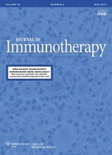
JOURNAL OF IMMUNOTHERAPY
Scope & Guideline
Advancing the Frontiers of Immunotherapy Research
Introduction
Aims and Scopes
- Clinical Efficacy of Immunotherapies:
The journal publishes studies evaluating the clinical outcomes of various immunotherapeutic agents, including immune checkpoint inhibitors, CAR-T cells, and bispecific antibodies in different cancer types. - Mechanisms of Immune Response:
Research focused on understanding the biological mechanisms underlying immune responses to cancer therapies is a core area, including studies on immune cell infiltration, tumor microenvironment interactions, and immune signaling pathways. - Adverse Effects and Management:
The journal addresses the safety and adverse effects associated with immunotherapy, publishing findings on immune-related adverse events and their management strategies. - Biomarkers and Predictive Models:
There is a strong emphasis on identifying biomarkers that can predict responses to immunotherapy, including genetic, epigenetic, and immune profiling studies. - Innovative Therapeutic Strategies:
The journal encourages submissions on novel therapeutic strategies that combine immunotherapy with other treatment modalities, such as chemotherapy, targeted therapy, and radiation, to enhance efficacy. - Translational Research:
The journal bridges the gap between laboratory research and clinical application, promoting studies that translate findings from bench to bedside and enhance patient outcomes.
Trending and Emerging
- Combination Immunotherapy Approaches:
There is a notable increase in research focusing on combination therapies that integrate immunotherapy with other treatments, such as chemotherapy and targeted therapies, indicating a trend towards synergistic treatment strategies. - Real-world Evidence Studies:
Recent publications emphasize the importance of real-world evidence in understanding the effectiveness of immunotherapies outside of clinical trial settings, providing insights into patient demographics and treatment outcomes. - Personalized Immunotherapy:
Emerging research is increasingly focused on personalized approaches to immunotherapy, including patient-specific biomarker identification and tailored treatment regimens based on individual tumor characteristics. - Microbiome and Immunotherapy Interactions:
An emerging area of interest involves studying the interactions between the microbiome and immune responses to cancer therapies, highlighting the role of gut health in treatment efficacy. - Novel Immune Modulators:
The exploration of new immune modulators, such as novel checkpoint inhibitors and bispecific antibodies, is on the rise, showcasing an expanding arsenal of therapeutic options in immuno-oncology. - Long-term Outcomes and Survivorship:
There is growing attention to the long-term effects of immunotherapy on cancer survivors, including studies on quality of life, late-onset adverse effects, and strategies for post-treatment management.
Declining or Waning
- Traditional Chemotherapy Combinations:
Research exploring traditional chemotherapy combinations with immunotherapy appears to be waning, as the field shifts towards more innovative combination strategies and personalized approaches. - Basic Immunology Studies:
The journal has seen a decrease in purely basic immunology studies that do not directly relate to cancer treatment, as the emphasis is increasingly on translational and clinical research. - Older Immunotherapeutic Agents:
There is less focus on older immunotherapeutic agents that have been largely replaced by newer, more effective therapies. This trend indicates a move towards cutting-edge treatments rather than revisiting past modalities. - Single-agent Immunotherapy Studies:
As combination therapies gain prominence, studies focusing solely on single-agent immunotherapy outcomes have become less common, reflecting a shift towards integrated treatment approaches.
Similar Journals
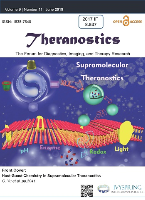
Theranostics
Empowering Research for Tomorrow's Therapies.Theranostics is a premier journal in the field of Medicine and Pharmacology, published by IVYSPRING INT PUBL. With its commitment to open access since 2011, it facilitates the widespread dissemination of innovative research, fostering collaboration and advancements in therapeutic diagnostics. The journal proudly holds a Q1 ranking in both Medicine (Miscellaneous) and Pharmacology, Toxicology and Pharmaceutics, as of 2023, showcasing its esteemed position within the scientific community. Recognized globally, it ranks in the top 1%, with Scopus rankings placing it as 4th out of 398 in Medicine and 1st out of 43 in Pharmacology. Theranostics serves as a crucial platform for researchers, professionals, and students to explore cutting-edge developments as it converges multidisciplinary approaches to enhance patient care and treatment efficacy. With a focus on bridging experimental research and clinical applications, the journal is instrumental in shaping future therapies and diagnostic strategies.

CANCER IMMUNOLOGY IMMUNOTHERAPY
Exploring Innovative Therapies for Cancer PatientsCancer Immunology Immunotherapy, published by Springer, stands as a premier journal in the fields of cancer research and immunology, holding a prestigious Q1 ranking across multiple categories, including Oncology and Medicine as of 2023. With an ISSN of 0340-7004 and an E-ISSN of 1432-0851, this journal has been a pivotal platform for groundbreaking research since its inception in 1976, continuing to provide insight into the complex interactions between the immune system and cancer. The journal's scope encompasses a wide array of topics, including novel therapeutic strategies, immunological mechanisms, and translational science aimed at advancing treatment outcomes for cancer patients. Renowned for its rigorous peer-review process and high impact factor, it attracts contributions from leading experts and researchers around the globe, positioning itself among the top-tier publications with Scopus rankings that reflect its vital role in advancing the field. Access options are generally subscription-based, ensuring a comprehensive resource for professionals and academics seeking to deepen their understanding and make meaningful contributions to cancer immunotherapy.

Journal of Immunotoxicology
Connecting Knowledge to Impact Human HealthJournal of Immunotoxicology, published by Taylor & Francis Ltd, is at the forefront of research in the intersecting fields of immunology and toxicology. With an annual impact factor that reflects its growing influence, this Open Access journal has been essential for disseminating valuable knowledge since its inception in 2004. The journal welcomes novel research articles, reviews, and commentary that explore the effects of xenobiotics on the immune system, contributing to a deeper understanding of immunotoxicological mechanisms and implications for human health. As a recognized platform, it has achieved commendable rankings in Scopus, positioning it within Q3 in Immunology and Q2 in Toxicology categories as of 2023. This ensures that the journal remains a critical resource for researchers, professionals, and students seeking to advance their knowledge and contribute to the evolving landscape of immunotoxicology. With an Open Access model since 2017, it maximizes accessibility and reaches a global audience, supporting the collaborative efforts needed to address contemporary challenges in health and safety.
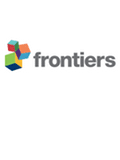
Frontiers in Immunology
Advancing Immunological Insights for a Healthier TomorrowFrontiers in Immunology is a leading open-access journal published by FRONTIERS MEDIA SA since 2010, dedicated to advancing knowledge in the field of immunology. With an impressive Q1 ranking in both Immunology and Allergy as of 2023, this journal exemplifies excellence in research dissemination, positioning itself among the top 22% of relevant literature in the discipline. The journal, based in Switzerland, emphasizes its commitment to open science by ensuring all published research is freely accessible, fostering collaboration and innovation among researchers, professionals, and students alike. With substantial visibility demonstrated by its ranks within the Scopus database—ranked #52 out of 233 in Immunology and Allergy, and #58 out of 236 in Immunology and Microbiology—Frontiers in Immunology serves as a vital platform for cutting-edge research. Researchers are invited to contribute original investigations and reviews that expand the understanding of immune mechanisms, therapeutic advancements, and clinical applications, making it a cornerstone for those looking to push the boundaries of immunological science.
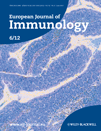
EUROPEAN JOURNAL OF IMMUNOLOGY
Championing Innovative Insights in ImmunologyWelcome to the European Journal of Immunology, a premier peer-reviewed journal dedicated to advancing the field of immunology and allergy research. Established in 1971 and published by Wiley, this esteemed journal has been consistently ranked in the top quartile (Q1) across its categories, highlighting its significant impact within the scientific community. With an impressive Scopus ranking, the journal occupies the 64th position in Immunology and Allergy and the 74th in the broader sector of Immunology and Microbiology, demonstrating its vital role in driving innovation and knowledge in immunological studies. The European Journal of Immunology publishes high-quality original research, comprehensive reviews, and insightful commentary, making it an indispensable resource for researchers, healthcare professionals, and students dedicated to understanding the complexities of the immune system. Although not an open-access journal, it offers various subscription options to ensure that institutions and individuals can access pivotal research that shapes the future of immunology.

Immunotherapy Advances
Advancing the frontier of immunology with cutting-edge research.Immunotherapy Advances, published by Oxford University Press, stands at the forefront of the rapidly evolving field of immunology and microbe interactions, focusing specifically on novel immunotherapeutic strategies and their clinical applications. Established in 2021, this peer-reviewed journal aims to disseminate high-quality research that contributes to the understanding and advancement of immunotherapeutic techniques, potentially transforming patient care in immunology. With a current Scopus rank of #140 out of 236 in the realm of Immunology, placing it in the 40th percentile, Immunotherapy Advances is positioned to be an integral resource for researchers, healthcare professionals, and students eager to stay updated with groundbreaking findings and methodologies. The journal is dedicated to fostering innovative discussions and collaborations, ensuring open access to vital research that influences treatment paradigms globally.
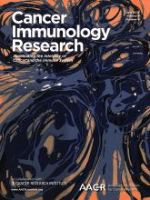
Cancer Immunology Research
Driving Progress in Cancer Treatment through ImmunologyCancer Immunology Research is a leading journal dedicated to the rapidly evolving field of cancer immunology, published by the American Association for Cancer Research. Established in 2013, this prestigious journal has quickly made a significant impact in its domain, achieving a 2023 Q1 ranking in both Cancer Research and Immunology. With an impressive Scopus rank of 24 out of 230 in cancer research and 28 out of 236 in immunology, it occupies a valuable position for researchers, professionals, and students engaged in cutting-edge cancer studies. Although it does not offer open access, the journal is committed to disseminating high-quality, peer-reviewed research that advances our understanding of the immune system’s role in cancer. The journal's objectives include fostering innovative studies, enhancing collaboration across disciplines, and promoting the translation of research findings into clinical applications, making it a vital resource for anyone invested in cancer therapy and immunological research.

INTERNATIONAL JOURNAL OF ONCOLOGY
Empowering breakthroughs in oncology and patient care.INTERNATIONAL JOURNAL OF ONCOLOGY is a leading academic publication dedicated to advancing the field of cancer research and treatment. Published by SPANDIDOS PUBL LTD in Greece, this journal, with ISSN 1019-6439 and E-ISSN 1791-2423, has established itself as a reputable source of peer-reviewed articles since its inception in 1993. With an impressive Q2 ranking in both Cancer Research and Oncology categories, as well as high Scopus ranks reflecting its significant contribution to the fields of Medicine and Biochemistry, the journal offers a platform for researchers, clinicians, and students alike to disseminate their findings and engage in dialogue surrounding innovative practices and breakthroughs. Although the journal follows a traditional subscription model, it continues to attract a diverse readership interested in the latest developments in oncological research, providing essential insights into cancer biology, therapeutics, and patient care. With a commitment to excellence, the INTERNATIONAL JOURNAL OF ONCOLOGY plays a vital role in shaping the future of oncology research and is a must-read for anyone passionate about advancing cancer treatment and prevention.
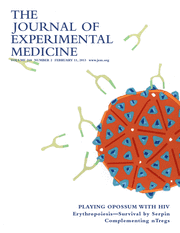
JOURNAL OF EXPERIMENTAL MEDICINE
Innovating Solutions for Tomorrow's Health ChallengesJOURNAL OF EXPERIMENTAL MEDICINE, published by Rockefeller University Press, is a renowned peer-reviewed journal dedicated to advancing the field of experimental medicine since its inception in 1896. With an impressive impact factor and categorized in the Q1 quartile for Immunology, Immunology and Allergy, and Miscellaneous Medicine, this journal stands at the forefront of medical research and innovation. It provides a prestigious platform for scholars and practitioners to disseminate groundbreaking findings that drive the understanding of disease mechanisms and therapeutic strategies. While the journal is not open access, it maintains high visibility and engagement within the scientific community, fostering collaboration among researchers, professionals, and students alike. The journal's consistent ranking in the top percentiles of Scopus illustrates its significant impact and commitment to excellence in medical research.
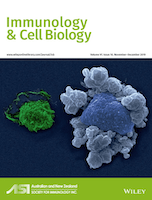
IMMUNOLOGY AND CELL BIOLOGY
Connecting Researchers in the Realm of Immunology and Cell ScienceIMUNOLOGY AND CELL BIOLOGY, published by Wiley, serves as a prominent platform for disseminating cutting-edge research in the fields of immunology and cell biology. With an ISSN of 0818-9641 and an E-ISSN of 1440-1711, this journal has established itself since its inception in 1987, demonstrating a commitment to advancing knowledge in its disciplines through high-quality articles. Renowned for its rigorous peer-review process, it holds a Q2 quartile ranking in both immunology and cell biology categories as of 2023, showing its competitive stature in these fields. IMUNOLOGY AND CELL BIOLOGY is indexed among the elite journals worldwide, with impressive Scopus rankings, including a rank of #75/233 in Immunology and Allergy. The journal’s comprehensive scope ensures that it caters to an audience of researchers, professionals, and students who are dedicated to exploring the intricate mechanisms of immune responses and cellular interactions. Although it does not operate under an open access model, its subscription-based content remains invaluable for those seeking to broaden their understanding of immunology and cell biology. By providing a forum for significant scientific dialogue, IMUNOLOGY AND CELL BIOLOGY continues to shape the future of research in these vital areas.